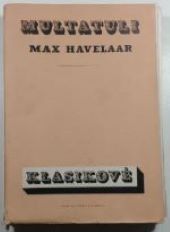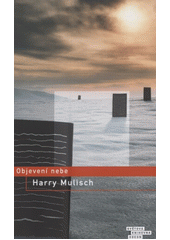Max Havelaar & The Discovery of Heaven
The novels Max Havelaar (1861) by Multatuli (ps. of Eduard Douwes Dekker, 1820-1887) and De Ontdekking van de Hemel (The Discovery of Heaven) by Harry Mulisch (1927-2010) are considered highlights of Dutch literature. Both works have been translated into Czech.
Max Havelaar
The opus magnum by the Dutch writer Multatuli Max Havelaar is one of the few Dutch books that has several Czech translations. Part of the novel was translated for the first time by Krista Nevšímalová (1854-1935), the leader of the Czech women's movement. The fragment was published in 1903 by the Social Democrat Josef Pelcl in the collection Výbor ze spisův, jež napsal Multatuli (Anthology of works written by Multatuli). The starting point for the creation of this anthology was a review of the German translation which was written by the modernist Fratišek V. Krejčí (Engelbrecht 2021: 109-116).
It can be stated that Max Havelaar was already known to Czech readers before the Czech translation. This is evident, for example, from the fact that this novel was quoted in the Czechoslovak Parliament (Engelbrecht 2015: 77). Czech readers probably knew the book thanks to a German translation by Wilhelm Spohr.
The Translation by Rudolf J. Vonka

The first complete translation with the title Max Havelaar. Dražební řízení v holandské obchodní společnosti (Max Havelaar. Auction procedure in a Dutch trading company) was realized by the “Renaissance Man” Rudolf Jordán Vonka (1877-1964). The translation he worked on during the Second World War was published in 1947 by the publishing house Svoboda (The Freedom). The publisher placed the book in the prestigious Klasikové (The Classics) series. Max Havelaar was the very first title of this series.
The reason why Max Havelaar in its entirety was only released so late after the publication of the original is due to the fact that strict translation standards have been in force in the Czech Republic since the middle of the 19th century. According to these standards, it was not desirable to translate works of high literary quality via an intermediate language. As there were virtually no translators capable of translating Max Havelaar directly at that time, this had to wait several decades (Engelbrecht 2021: 110).
Although Vonka was one of the first two Czech translators (together with Lída Faltová) to specialize in Dutch, it can be noted that his translation was not very good. As some scholars, including Olga Krijtová, Wilken Engelbrecht and Veronika Horáčková, have noted, Vonka's translations are often erroneous and contain more text than the original. The term “the spirit of Vonka” has even become established in the Czech Dutch Studies, which refers to inaccuracies in translations (Engelbrecht 2019).
The Translation by Miroslav Drápal
The second complete translation was made by the translator Miroslav Drápal (1916-1991) who, among other things, made a translation of Anne Frank's diary. This translation was again published by Svoboda, this time in the series Úsvit. Světový sociální roman (Dawn. World social novel). This edition subtitled Kávová burza nizozemské obchodní společnosti (The Coffee Exchange of a Dutch Trading Company) was released in 1974. As for this translation, it can be noted that it is closer to the original and of a higher level of quality than the first one.
De Ontdekking van de Hemel (The Discovery of Heaven)

Another example of a Dutch canonized work translated into Czech, this time from contemporary literature, is De ontdekking van de hemel (The Discovery of Heaven) by Harry Mulisch. This translation also had to wait a few years. The Czech version was released in 2010, which means eighteen years after the original. The translation was published by the prestigious Odeon publishing house, specifically in the series Světová knihovna (The World Library). In addition to Mulisch, this series also featured other renowned authors, such as Joost Zwagerman, Haruki Murakami and Michael Cunningham.
The Discovery of Heaven is Mulisch's fifth and last work published in Czech. The first two were books translated by the grande dame of the Czech Dutch Studies Olga Krijtová (1931-2013), the last three by her student Veronika ter Harmsel Havlíková (*1972). Havlíková, who is one of the most active and renowned Czech translators from Dutch, has received a special award in the Josef Jungmann Prize for the translation of The Discovery of Heaven.
The translator and the chief editor of Odeon, who then worked as the editor of this book, note that the publisher decided to release The Discovery of Heaven because of the fame of the book and of the author himself. The success of the work on the German book market, which is often decisive for Czech publishers, also played a certain role in this. Odeon wanted to increase his prestige by publishing the novel. The Czech edition was therefore relatively successful (oral/written communication).
References
Engelbrecht, Wilken (2015). ‘The Formation of a Literary Canon of Dutch and Flemish Literature in Translation’. In: (ed.) Jana Engelbrechtová, Dutch – Flemish – Central European Relations. Palacký University in Olomouc, 2015, p. 70-84.
Engelbrecht, Wilken (2019). ‘De “geest van Vonka” of hoe een slechte vertaler de Nederlandstalige literatuur propageerde’. Spiegel der Letteren 61 (2019), nr. 1, p. 25-56. DOI: doi.org/10.2143/SDL.61.1.3286676
Engelbrecht, Wilken (2021). Van Siska van Rosemael tot Max Havelaar. Receptie van Nederlandstalige literatuur in Tsjechische vertaling tussen 1848 en 1948. Gent: Academia Press (Lage Landen Studies 14)
